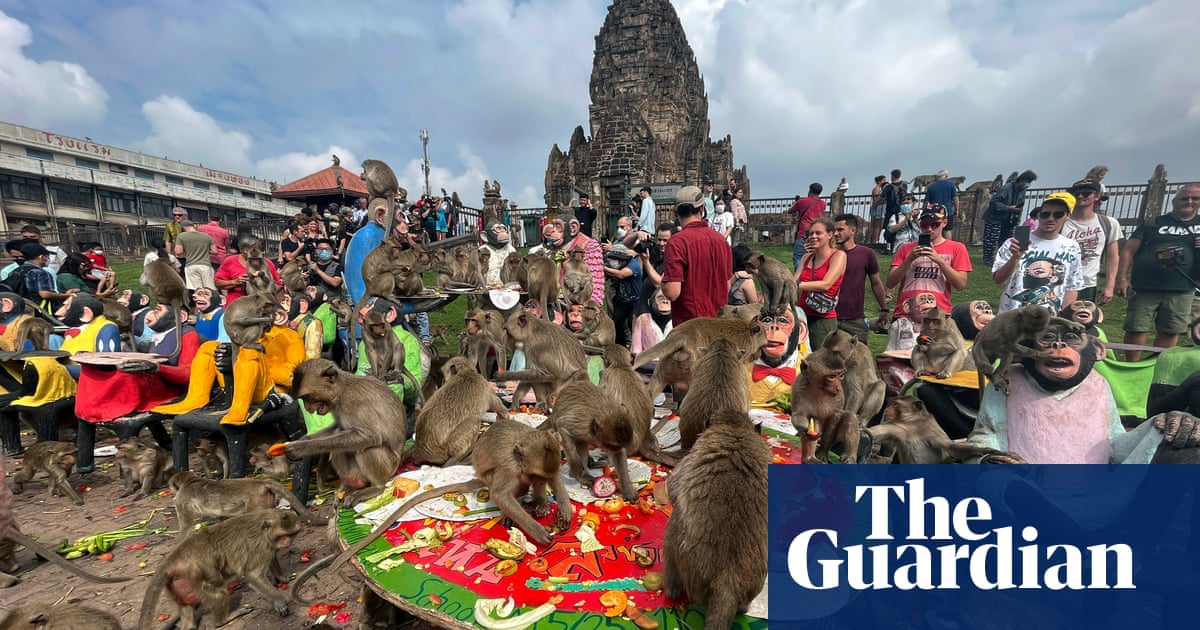
Mischievous long tailed macaques are, for many, a symbol of the Thai city of Lopburi. Tourists flock to the city’s ancient temple to feed the macaques fresh fruit and photograph them as they maraud the streets. But, increasingly, residents say they have had enough.
This week, after growing complaints from residents, wildlife officials announced a plan to round up 2,500 of the urban monkeys and place them in huge enclosures. It follows an incident in March where a woman was left with a dislocated knee after being kicked in the back by a monkey that wanted her food. Separately, a man lost control of his motorcycle after a monkey tried to grab a bag of food from him.
“I don’t want humans to have to hurt monkeys, and I don’t want monkeys to have to hurt humans,” Athapol Charoenshunsa, the director-general of the department of national parks, wildlife and plant conservation, said at a news conference.
Some people have fed the monkeys for generations and feel they are a part of the city’s identity. Others say the macaque population has grown far too big and that the animals are damaging to businesses and properties and are endangering people’s health.
“People say that if there are no monkeys, then it is not Lopburi,” one resident, Phairoth, told the Thai broadcaster Channel 3. “I want people who say that to take a monkey into their own house and look after it. Let’s share them, five per house, 10 per house. I’ll help deliver the food to their house as well.”
The monkeys are infamous for ambushing people and businesses in search of snacks. Some food sellers have resorted to carrying slingshots to threaten the animals if they approach. Shops have installed metal grilles and displayed large toy animals – crocodiles or tigers – to deter intruders. When the Thai prime minister, Srettha Thavisin, visited the city this year, residents tried to hand him a printed frame of an image that had gone went viral on social media of a young girl holding a toy gun to warn off monkeys as she walked through the city.
","alt":"Instagram post showing girl pointing toy gun at monkey.","index":6,"isTracking":true,"isMainMedia":false,"source":"Instagram","sourceDomain":"instagram.com"}” config=”{"renderingTarget":"Web","darkModeAvailable":false}” readability=”3″>
Allow Instagram content?
This article includes content provided by Instagram. We ask for your permission before anything is loaded, as they may be using cookies and other technologies. To view this content, click ‘Allow and continue’.
Athapol said he expected the first phase of the catching operation to start within weeks and that the enclosures would be big enough to contain thousands of monkeys. A small number of monkeys will be allowed to remain in the city.
Wildlife authorities began rounding up the most aggressive alpha males last week, catching 37 monkeys so far. According to Thai media, four gang leaders are among those caught. A fifth monkey, known for stealing underwear and necklaces from a shop, is still on the loose.
The city is home to rival troops of monkeys that occupy different buildings, including a derelict cinema. Monkeys that are caught will be kept in enclosures for their group, authorities said.
“There are people who like monkeys, while others don’t. I think that, compared to 10 years ago, the population of monkeys has increased significantly,” said resident Job Jirapat, who added she understood both sides.
The authorities have run sterilisation campaigns, and from 2014-2023 neutered about 2,600 macaques. Residents say this isn’t enough.
Female monkeys are able to reproduce twice a year, and the abundance of high-sugar treats given over recent decades has meant they have plenty of energy to do so. Last year, the population totalled 5,709.
“If sterilisation can be carried out consistently, it is a good long-term solution,” said Job. “I have a feeling that the government didn’t take it seriously. It is possible that they were not able to continue because of a lack of funding, which is why the number of monkeys is increasing so quickly. Another thing that we should do is stop feeding monkeys.”
Experts have in the past said there needs to be greater education about what type of food can be given to monkeys, and how and when they should be fed. The province celebrates an annual “monkey buffet” festival, where the monkeys are given huge feasts of fresh fruit and other treats.
Athapol said the roundup of monkeys will “solve the problem very quickly”. It will be carried out in phases, he said.
Some people are sceptical. “If the officers only capture a few ones or only the mean ones, then, to be honest, it won’t make any difference,” Panya Phaopahol, a noodle seller, told Channel 7 TV.
Job said that while monkeys may be a symbol of the city, having fewer around would improve people’s quality of life and keep the city cleaner. “And I think Lopburi has more to offer than just monkeys,” she said.
Associated Press contributed to this story